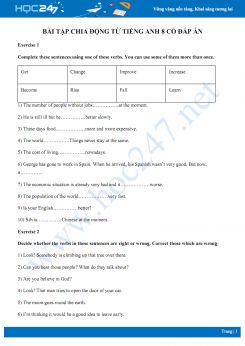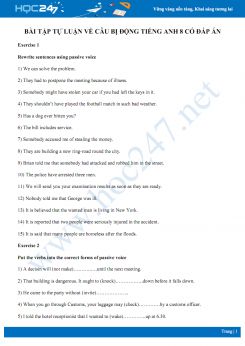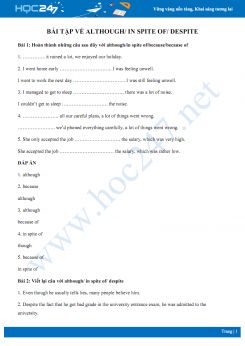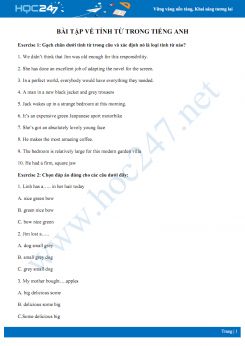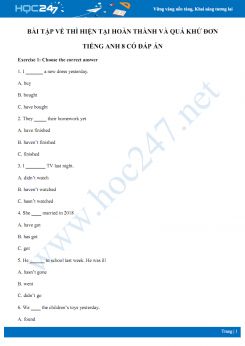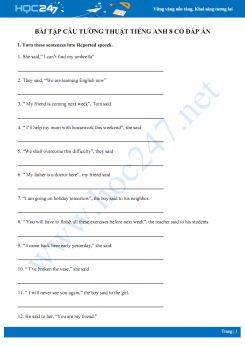Dưới đây là tài liệu Bài tập Modal verb có đáp án. Tài liệu được biên soạn nhằm giới thiệu đến các em dạng bài tập để các em luyện tập cũng như chuẩn bị thật tốt cho kì thi học kì 2. Mời các em cùng tham khảo!
BÀI TẬP MODAL VERB CÓ ĐÁP ÁN
1. Đề bài
1.1. Complete these sentences with can / can’t, could / couldn’t or be able to (correct form). Sometimes it is possible to use more than one modal verb
1) Tom……………drive but he hasn’t got a car.
2) I can’t understand Martin. I’ve never……………….understand him.
3) He had hurt his leg, so he……………..walk very well.
4) She wasn’t at home when I phoned, but I……………..contact her at the office.
5) I looked very carefully and I……………see a figure in the distance.
6) I used to…………..stand on my head but I can’t do it now.
7) They didn’t have any tomatoes in the first shop I went to, but I……………get some in the next shop.
8) My grandmother loved music. She……………..play the piano very well.
9) Ask Ann about your problem. She should…………….help you.
10) The boy fell into the river but fortunately we……………..rescue him.
1.2. Read a situation and write a sentence with must have or couldn’t have (done). Use the words in brackets
1) That dress you bought is very good quality. (It must / be / very expensive)
2) I haven’t seen Jim for ages. (He must / go away)
3) I wonder where my umbrella is. (You must / leave it on the rain)
4) Don passed the examination. He didn’t study very much on it. (The exam couldn’t / be / very difficult)
5) She knew everything about our plans. (She must / listen / to our conversation)
6) Dennis did the opposite of what I asked him to do. (He couldn’t / understand / what I said)
7) When I woke up this morning, the light was on. (I must / forget / to turn it off)
8) I don’t understand how the accident happened. (The driver couldn’t / see / the red light)
9) The phone rang but I didn’t hear it. (I must / be / asleep)
10) She passed me in the street without speaking. (She couldn’t / see / me)
1.3. Read the situation and decide what you want to say. Use modal verbs
1) You have to carry some heavy boxes upstairs. Ask someone to help you.
2 You want your friend to show you how to change the film in your camera. What do you say to him/her?
3) You’re on a train. The woman next to you has finished reading her newspaper. Now you want to have a look at it. What do you say?
4) You need a match to light your cigarette. You haven’t got any but the man sitting next to you has some. What do you ask him?
5) There is a concert on tonight and you are going with some friends. You think Tom would enjoy it too. Invite him.
6) You’re in the post office. You want three stamps for Japan. What do you say?
7) You’re sitting in a crowded bus. There is an ola lady standing. Offer her your seat.
8) You’re in a car with a friend, who is driving. He is going to to park the car but there is a NO PARKING sign. You see the sign and say…
9) A friend has just come to see you in your flat. Offer him something to drink.
10) You are at the interview. You want to smoke a cigarette. What do you ask?
1.4. Complete these sentences with must (not) or (not) have to (correct form)
1) You really…………work harder if you want to pass that examination.
2) Many children in Britain……………wear uniform when they go to school.
3) Last night Don suddenly became ill. We………….call the doctor.
4) I can stay in bed tomorrow morning because I…………….work.
5) What ever you do, you……………touch that switch. It’s very dangerous.
6) Ann has…………..wear glasses since she was eight years old.
7) I’m afraid I can’t come tomorrow. I…………..work late.
8) I’m sorry I couldn’t come yeaterday. I……………..work late.
9) You…………….forget what I told you. It’s very important.
10) Tom may…………..go away next week.
11) We couldn’t repair the car ourselves. We……………take it to the garage.
12) She………….get up so early. She gets up early because she prefers to.
13) We…………..leave yet. We’ve got plenty of time.
14) When you come to London again, you……………come and see us.
15) I don’t want anyone to know. You………….tell anyone what I said.
1.5. Choose the correct answer
1) Which sentence is correct?
A. We should to leave soon.
B. We should leaving soon.
C. We should leave soon.
2) We………….visit Tom when we are in London.
A. didn’t ought B. ought C. should
3) Which question is correct?
A. We should call the police?
B. Should we call the police?
C. Do we should call the police?
4) Which sentence is correct?
A. We ought have a party to celebrate Kate’s birthday.
B. We ought to have a party to celebrate Kate’s birthday.
C. We should to have a party to celebrate Kate’s birthday.
5) You…………..ride a motorbike without a helmet.
A. shouldn’t B. ought C. ought not
6) Which question is correct?
A. Ought we to tell Jane the news?
B. Ought we tell Jane the news?
C. We ought to tell Jane the news?
7) Which sentence is NOT correct?
A. Nick may have missed the train.
B. Nick must have missed the train.
C. Nick ought have missed the train.
8) Which sentence is NOT correct?
A. I may have left the form at home.
B. He can’t have got lost.
C. Joseph must have forget about the party.
9) We……………not have bought enough biscuits for everyone.
A. may B. should C. must
10) Which sentence means “Maybe John went to the shop”?
A. John might not have gone to the shop.
B. John may have gone to the shop.
C. John must have gone to the shop.
1.6. Read the situations and write a sentence with should (not), should / shouldn’t have
1) Tom has just been offered a job. You think it would be good idea for him to accept it.
2) It’s very cold. Mr. Taylor, who has been ill recently, is walking along the road without a coat.
3) We went for a walk. While we were talking, we got hungry but we hadn’t brought anything with us to eat.
4) You think it would be a good idea for all motorists to wear seat-belts.
5) I went to Paris. Marcel lives in Paris but I didn’t go to see him while I was there. When I saw him later, he said…
6) The notice says that the shop is open every day from 8:30. It is now 9 o’clock but the shop isn’t open.
7) The driver in front stopped suddenly without warning and I drove into the back of his car. It wasn’t my fault.
8) You don’t think it would be a good idea for Jill and Sam to get married.
9) Your friend has a bad cold. Tell him that you think it would be a good idea for him to stay at home this evening.
10) The accident happened because I was driving on the wrong side of the road.
2. Đáp án
2.1.
1) can / is able to
2) been able to
3) couldn’t / wasn’t able to
4) was able to
5) could / was able to
6) be able to
7) was able to
8) could / was able to
9) be able to
10) were able to
2.2.
1) It must have been very expensive.
2) He must have gone away.
3) You must have left it on the train.
4) The exam couldn’t have been very difficult.
5) She must have listened to our conversation.
6) He couldn’t have understood what I said.
7) I must have forgotten to turn it off.
8) The driver couldn’t have seen the red light.
9) I must have been asleep.
10) She couldn’t have seen me.
2.3.
1) Could you give me a hand with these boxes?
2) Could you show me how to change the film?
3) May I have a look at your newspaper?
4) Could you give me a light?
5) Would you like to come to the concert tonight?
6) May I have three stamps for Japan?
7) Would you like a seat?
8) You can’t park here.
9) Can I get you something to drink? / Would you like something to drink?
10) May I smoke?
2.4.
1) must / have to
2) have to / must
3) had to
4) don’t have to
5) mustn’t
6) had to
7) have to / must
8) had to
9) mustn’t
10) have to
11) had to
12) doesn’t have to
13) don’t have to
14) must / have to
15) mustn’t
2.5.
1) C 2) C 3) B 4) B 5) A
6) A 7) C 8) C 9) A 10) B
2.6.
1) I think Tom should accept the job.
2) He should be wearing a coat.
3) We should have brought something to eat.
4) I think motorists should wear seat belts.
5) You should have come to see me when you were in Paris.
6) The shop should be opened.
7) He shouldn’t have stopped so suddenly without warning.
8) I don’t think Jill and Sam should get married.
9) I think you should stay at home this evening.
10) Tom shouldn’t have been driving on the wrong side of the road.
---
Trên đây là toàn bộ nội dung tài liệu Bài tập Modal verb có đáp án. Để xem thêm nhiều tài liệu tham khảo hữu ích khác các em chọn chức năng xem online hoặc đăng nhập vào trang hoc247.net để tải tài liệu về máy tính.
Hy vọng tài liệu này sẽ giúp các em học sinh ôn tập tốt và đạt thành tích cao trong học tập.
Các em quan tâm có thể tham khảo tư liệu cùng chuyên mục:
Chúc các em học tập tốt!



